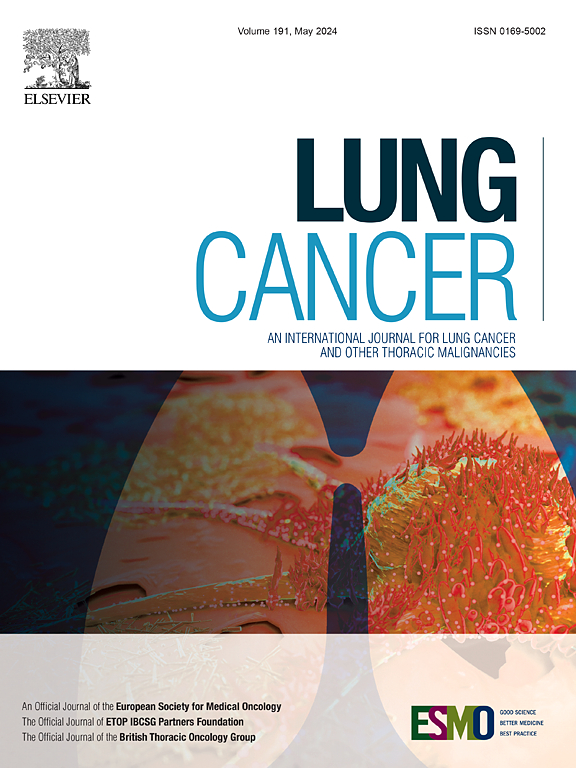免疫检查点抑制剂在肺肉瘤样癌中的疗效及TP53突变的预测潜力。
IF 4.5
2区 医学
Q1 ONCOLOGY
引用次数: 0
摘要
目的:肺肉瘤样癌(PSC)是一种罕见的异质性非小细胞肺癌(NSCLC)亚群。晚期PSCs患者由于对化疗和放疗的耐药以及靶向治疗的狭窄,生存期较差。免疫检查点抑制剂(ICIs)提供了新的希望,然而关于其有效性的数据有限。方法:本回顾性研究收集了2010年1月至2024年3月中国两个中心的晚期psc患者的医疗记录,分析了人口统计学、治疗和生存数据。包括60例病例。结果:在PD-L1表达检测中,80%的肿瘤呈PD-L1阳性,60%的肿瘤TPS≥50%。PSCs中最常见的突变基因是TP53(25.9%)、KRAS(22.8%)、MET(7.4%)、BRAF(7.4%)、CDKN2A/B(各7.4%)和EGFR(6.2%)。接受抗pd -1或抗pd - l1抗体治疗的晚期psc患者的中位生存期明显长于未接受抗pd -1或抗pd - l1抗体治疗的患者(NR vs. 11.2个月,p = 0.015)。ICI应用是晚期PSC患者预后的独立有利因素(HR 0.32, p = 0.008)。在以ci为基础的治疗亚组中,ORR和DCR分别为34.5%和82.8%。以ci为基础的治疗的mPFS和mOS分别为12.5和16.0个月。TP53突变和PD-L1 TPS≥80%与PFS延长(p = 0.021, p = 0.035)和OS延长(p = 0.013, p = 0.018)相关。结论:PD-L1阳性或高表达在晚期PSCs中普遍存在。抗pd -1或抗pd - l1抗体与良好的预后相关,应被视为缺乏可操作驱动突变的晚期PSC患者的关键治疗选择。除了PD-L1表达外,TP53突变也有可能预测ICIs治疗晚期PSC患者的疗效,其预后意义值得在更大规模的前瞻性研究中进一步验证。本文章由计算机程序翻译,如有差异,请以英文原文为准。
Efficacy of immune checkpoint inhibitors in pulmonary sarcomatoid carcinoma and predictive potential of mutated TP53
Objective
Pulmonary sarcomatoid carcinoma (PSC) is a rare, heterogeneous subgroup of non-small cell lung cancer (NSCLC). Patients with advanced PSCs have poor survival due to resistance to chemotherapy and radiotherapy, and narrow access to targeted therapy. Immune checkpoint inhibitors (ICIs) offer new hope, whereas data on their effectiveness is limited.
Methods
This retrospective study collected medical records of patients with advanced PSCs from January 2010 to March 2024 across two centers in China, analyzing demographic, treatment, and survival data. Sixty cases were included.
Results
In tumors tested for PD-L1 expression, 80 % had PD-L1 positivity, and 60 % exhibited TPS ≥ 50 %. The most frequently mutated genes in PSCs were TP53 (25.9 %), KRAS (22.8 %), MET (7.4 %), BRAF (7.4 %), CDKN2A/B (7.4 % each), and EGFR (6.2 %). Median OS of patients with advanced PSCs receiving anti-PD-1 or anti-PD-L1 antibodies in any line was significantly longer compared to those who did not (NR vs. 11.2 months, p = 0.015). ICI application was an independent favorable factor for the prognosis of patients diagnosed with advanced PSC (HR 0.32, p = 0.008). In the subgroup treated with ICI-based therapies, ORR and DCR were 34.5 % and 82.8 %, respectively. The mPFS and mOS of ICI-based therapies were 12.5 and 16.0 months, respectively. TP53 mutations and PD-L1 TPS ≥ 80 % were associated with prolonged PFS (p = 0.021, p = 0.035) and OS (p = 0.013 and p = 0.018).
Conclusions
Positive or high PD-L1 expression was prevalent in advanced PSCs. Anti-PD-1 or anti-PD-L1 antibodies were associated with favorable prognosis, and should be considered a key treatment option for patients with advanced PSC lacking actionable driver mutations. In addition to PD-L1 expression, TP53 mutations have the potential to predict the efficacy of ICIs in treating patients with advanced PSC and its prognostic significance deserves further validation in larger prospective studies.
求助全文
通过发布文献求助,成功后即可免费获取论文全文。
去求助
来源期刊

Lung Cancer
医学-呼吸系统
CiteScore
9.40
自引率
3.80%
发文量
407
审稿时长
25 days
期刊介绍:
Lung Cancer is an international publication covering the clinical, translational and basic science of malignancies of the lung and chest region.Original research articles, early reports, review articles, editorials and correspondence covering the prevention, epidemiology and etiology, basic biology, pathology, clinical assessment, surgery, chemotherapy, radiotherapy, combined treatment modalities, other treatment modalities and outcomes of lung cancer are welcome.
 求助内容:
求助内容: 应助结果提醒方式:
应助结果提醒方式:


